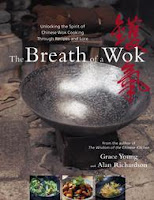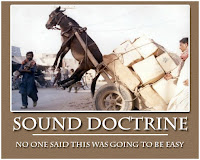 I just finished reading Grace Young's elegant story of Cantonese cuisine and the simple but critical tool (aka - WOK) used in its creation. I'm fascinated with food (and wine) and this was my first dip into the complex world of Chinese cuisine.
I just finished reading Grace Young's elegant story of Cantonese cuisine and the simple but critical tool (aka - WOK) used in its creation. I'm fascinated with food (and wine) and this was my first dip into the complex world of Chinese cuisine. A dialog about all things church & culture; especially the relationship between them.
Monday, September 7, 2009
The Art of the Wok
 I just finished reading Grace Young's elegant story of Cantonese cuisine and the simple but critical tool (aka - WOK) used in its creation. I'm fascinated with food (and wine) and this was my first dip into the complex world of Chinese cuisine.
I just finished reading Grace Young's elegant story of Cantonese cuisine and the simple but critical tool (aka - WOK) used in its creation. I'm fascinated with food (and wine) and this was my first dip into the complex world of Chinese cuisine. Saturday, August 29, 2009
For All You Church Leaders Out There:
- Do we church professionals (aka - pastors, staff, consultants, directors, elders, deacons, committee members, etc...) really want to change how we live?
- Are we willing to make room for "the other"?
- Do we want to engage in conversation with people that believe differently than we do?
- Can we live lives that are poured out to a world that, for the most part, see us as irrelevant at best and intolerant and evil at worst?
- Are we willing to change our church from the inside out....so that we live the life we call our people to live?
Storytelling In Worship:
 Story is a powerful medium. Culture is created, changed, and memorialized in story. Our lives are often (if not always) remembered in story; much more than facts, trivia, stats, etc.. I've never been to a memorial or grave-side service and heard a loved one share stats about their dearly departed. "Paul was 220, blue eyes, with a birthmark on his right shoulder. He had a GPA of 3.9 in grammar school and his SSN was/is ___-__-___." Stories are how we shape our present by remembering the past.
Story is a powerful medium. Culture is created, changed, and memorialized in story. Our lives are often (if not always) remembered in story; much more than facts, trivia, stats, etc.. I've never been to a memorial or grave-side service and heard a loved one share stats about their dearly departed. "Paul was 220, blue eyes, with a birthmark on his right shoulder. He had a GPA of 3.9 in grammar school and his SSN was/is ___-__-___." Stories are how we shape our present by remembering the past. Saturday, August 1, 2009
Revolutionary Road - A Grand Portrait of Selfishness


Friday, July 24, 2009
Read This Book
 One of my first on-ramps into missional thinking was Reggie McNeal's book The Present Future - Six Tough Questions for the Church (http://www.amazon.com/Present-Future-Tough-Questions-Church/dp/0787965685). I was blown away by the candor and honesty of
One of my first on-ramps into missional thinking was Reggie McNeal's book The Present Future - Six Tough Questions for the Church (http://www.amazon.com/Present-Future-Tough-Questions-Church/dp/0787965685). I was blown away by the candor and honesty of Sunday, July 12, 2009
Does Doctrine Get in the Way?

- Evangelical, Anglican, Presbyterian, Baptist....any follower of Jesus will likely be part of an institution/structure that brings with it rules, perspectives, thoughts on God and Sacraments. Just ask a Presbyterian to baptize you as an adult if you were already baptized as an infant...and you'll see what I mean. Our "books of order" and regulations are most often attempts to turn biblical gray into black and white.
- I believe we are prone to legalism and our attempts at being faithful to doctrine can lead us into a bondage that is more human than divine.
- Theology is a living thing - maturing, changing, and evolving. Doctrine, like institutions, seek to be fixed and firmly rooted; unchangeable and persevering.
- Our ability to interface with those outside our faith is seriously damaged when our doctrinal concerns surpass our kingdom concerns.
Wednesday, July 1, 2009
A New Script
 Walter Bruggemann is a theologian I'm currently knee-deep into. He has an over-arching premise regarding the role of ministry in society/culture that I've been wrestling with. He lays this out over 19 points but I'll summarize it for you in 4:
Walter Bruggemann is a theologian I'm currently knee-deep into. He has an over-arching premise regarding the role of ministry in society/culture that I've been wrestling with. He lays this out over 19 points but I'll summarize it for you in 4:- Everyone lives by a script and we are socialized into that script and it is outside our control.
- The dominant script in America is "technological - therapeutic - military - consumerism" and it makes failed promises of happiness and safety.
- It is the task of ministry to de-script that script and present an alternative script whose key character is the irascible, illusive, and sovereign Triune God.
- Since most of society is ambivalent and ambiguous about this script, ministry is to also manage that ambivalence in faithful ways through preaching, liturgy, social action, education, justice, and good neighboring of all kinds.
Saturday, June 27, 2009
Jackson & Fawcett:


Pop culture lost two significant icons this past week. Michael Jackson (http://en.wikipedia.org/wiki/Michael_jackson) and Farrah Fawcett (http://en.wikipedia.org/wiki/Farrah_Fawcett) have each left a legacy behind them that anyone above the age of 20 understands (to some degree).
- We are all people who live in and through culture. Culture permeates our existence like air in our lungs. We have no choice - it simply is.
- We all have markers - totem poles - memories that effectively embody or capture what that particular time was about.
- Those markers take on an almost mythological value because of all they represent.
- When our icons, markers, totems, etc... leave us (death, decay, change, etc..) we grieve the loss of what was....the familiar......security.
Tuesday, June 23, 2009
Re-Brand Us
Monday, June 22, 2009
"the world"
Wednesday, June 17, 2009
Certitude:
Thursday, June 11, 2009
Worship or Mission or Discipleship?
Wednesday, June 10, 2009
Mustard Seed

I love that Jesus used parables to teach Kingdom truth. It resonates with the artist in me. Parables give truth room to breathe...they aren't linear and literal, but artistic and abstract.
The parable of the mustard seed found in Matthew, Mark, and Luke (and Thomas for any Catholics out there) has been on my mind lately. Here is Luke's telling from 13:18 - 19 (NRSV):
"He said therefore, ‘What is the kingdom of God like? And to what should I compare it? It is like a mustard seed that someone took and sowed in the garden; it grew and became a tree, and the birds of the air made nests in its branches."
Loads of meaning here...
- start small - ends big
- grows beyond its limits and provides shelter for the birds
- it was intentionally planted in a garden" (that is crazy given it was a weed)
- counter intuitive given the "cedar of lebanon" image used in the OT
- hearkens back to Daniel and Ezekiel imagery regarding the coming kingdom of God
Here is what kicks my buttocks...and why I love this parable so much:
- Mustard seeds were outlawed by the religious institution of the day. This can be found in the Torah, Mishnah, and other traditions (both oral and written) dating back to Pharisaic times.
- They were outlawed largely because they were out-of-control weeds that would overtake a crop becoming 10 - 15 foot weed-shrubs.
- The people hearing Jesus were mostly agrarian and good "law abiding" folk - they understood this stuff.
- The weed grows to provide shelter for the birds...which most farmers didn't love...since they ate their seed and crops!!
So here you have Jesus, the rabbi of all rabbis, likening God's Kingdom (aka - the Kingdom of Heaven) to a small seed which grows into a weed and overtakes the garden it has been planted in...ultimately providing shelter for the birds, which were not considered friends since they ate the crops and seeds.
This is radical stuff baby! Jesus was essentially turning the established house upside down with this parable.
I am left feeling excited...and unsettled. I like gardens. I like things controlled and predictable....safe and secure. And yet...here is Jesus saying that the Kingdom He is bringing will uproot our gardens...and provide shelter for the people we consider problematic to our garden.
I'm curious....do hear this as good news...or....?
Tuesday, June 9, 2009
A Church Going Deep:
- how do we spend our money?
- how (and why) do we gather for worship?
- how do we "change the scorecard" - so our metrics measure what we value and care about (which needs to be more than butts in seats and dollars)
- how does a "whole church bring a whole gospel to a whole city?"
- how do we change the congregation's expectations and assumptions of why the church and staff exist? Moving from institutional attractionalism to missional empowerment. Moving form doing church (or going to church) to being the church.
- how do those who know Jesus begin to intentionally invest time and relationship into the lives of those who DO NOT know Jesus - not because we have an agenda, but because God has sent us into our world to be with people that do AND DO NOT know Him like we do.
Thursday, May 28, 2009
Truth Through Tension

- Tension reminds us that we who follow Jesus are diverse WHILE being united. That the diversity of experience, opinion, belief, and understanding in the body of Christ is a gift - not a curse.
- Tension reveals our inadequacies and demonstrates our need for God.
- Tension allows us opportunity to listen and learn from people not like us.
- Tension results in more critical thinking, thoughtful analysis, and better decision making.
Friday, May 22, 2009
Creativity, Failure, and the Church

The video I linked in my earlier post claimed that outside-the-box thinking (aka - creative and/or lateral thinking) is a discipline to be developed more than an opportunistic spark that simply hits on occasion. He posited that there are societal and systemic reasons for the restraint and/or the unleashing of creativity amongst people. I completely agree.
I would argue that the paradigm and operating idea of the christian church in America is changing rapidly and our fear of failure, our unfamiliarity with creative thinking, and low tolerance for risk are undermining our ability to adapt and solve new problems. This statement, of course, is a sweeping generalization. There are several churches and Jesus movements across America that are pioneering new territory and thoughtfully trying new and radical ideas; but they are miniscule (in my opinion) compared to the majority that are entrenched and often blind to the realities leading to their demise. If they wait much longer they will follow in way of GM.
Working towards a solution - 3 things that will help bring change:
- Empower (no...require...demand....provoke) your church community to dream. If Erwin is right (earlier quote) then they have a calling and imagination that will be critical to the future...just as much as the dreams and imagination of the staff.
- Change the culture of your leadership by rewarding risk and lateral thinking. We learn more when we fail than when we succeed.
- Take a long and hard look at reality. Get to know the stats about the church in America. Understand the perception that many in your community have of your church. Keep it Real.
Creativity & The Brain
I've been thinking quite a bit on creation. Not God's act of...but on our involvement and participation in the process of creating. Do we create - are we creative - how involved are our imaginations in any part of our lives? How would life change if we harnessed our ability to imagine, dream, and create towards those dreams. Artists do this....but they are a slim percentage of the population.
Watch this video and leme know your thoughts....I'll be writing more on this tonight.
Thursday, May 21, 2009
Cultura: To Cultivate
 This blog should have happened long ago. Many of you have been encouraging me to do something like this for years and I'm grateful for your relentlessness.
This blog should have happened long ago. Many of you have been encouraging me to do something like this for years and I'm grateful for your relentlessness.I am passionate about helping the American Church discover and embrace the diversity of cultures outside its boundaries and often self-imposed limitations. I hold a core belief that God is far larger than any single culture could ever fully express. That through the tapestry of diverse expression we are able to experience and know God more deeply. That the ever expanding cultural diversity and pluralism of America is a gift to the American church, to our theology, and to our ability to see God's Kingdom increasingly realized on earth (as it is in Heaven).
My hope is that this blog does a worthy of job of exploring such a huge topic; and make NO mistake about it....culture is a HUGE topic. That single word embraces ethic identity, values, beliefs, stories, mores, political ideas, artistic preferences, tribal realities, etc... My hope is that you'll join me on occasion - that you will chime in with your thoughts, opinions, stories, and that you will enrich this discussion.
Culture comes from the Latin "cultura" - stemming from "colere," meaning "to cultivate." That is posture I want those of us who follow Jesus to take towards cultures different than our own. We need to cultivate the good, fan the flame of God who is busy at work within culture, and allow our own perspectives and thoughts on God to be stretched as we see him in new and often challenging ways. God is not limited or threatened by cultural diversity - Jesus was not limited by the cultural realities of His day - Paul was a brilliant student of those cultures he ministered within - and the Christian Gospel has the incarnational power to enrich, empower, and redeem every single culture that has existed (and has yet to exist)!
can I get an AMEN ?